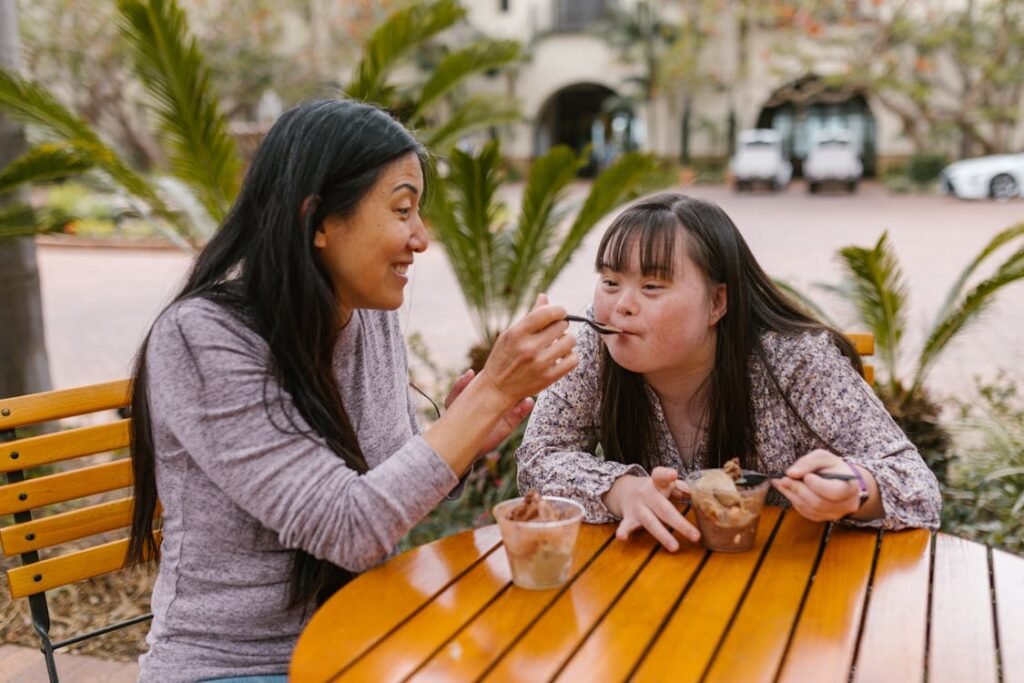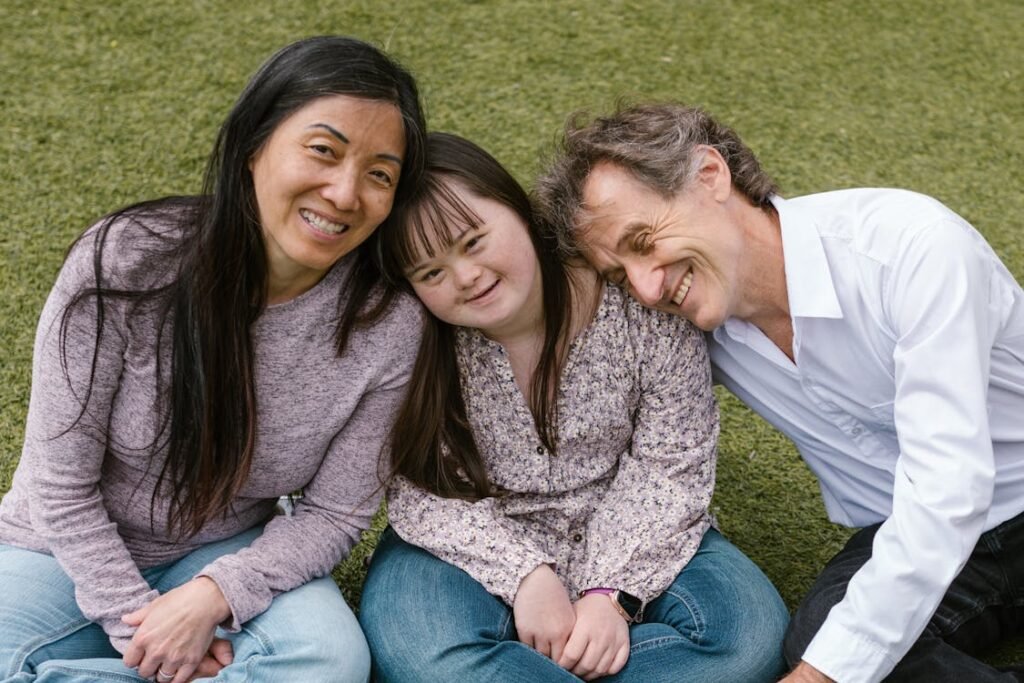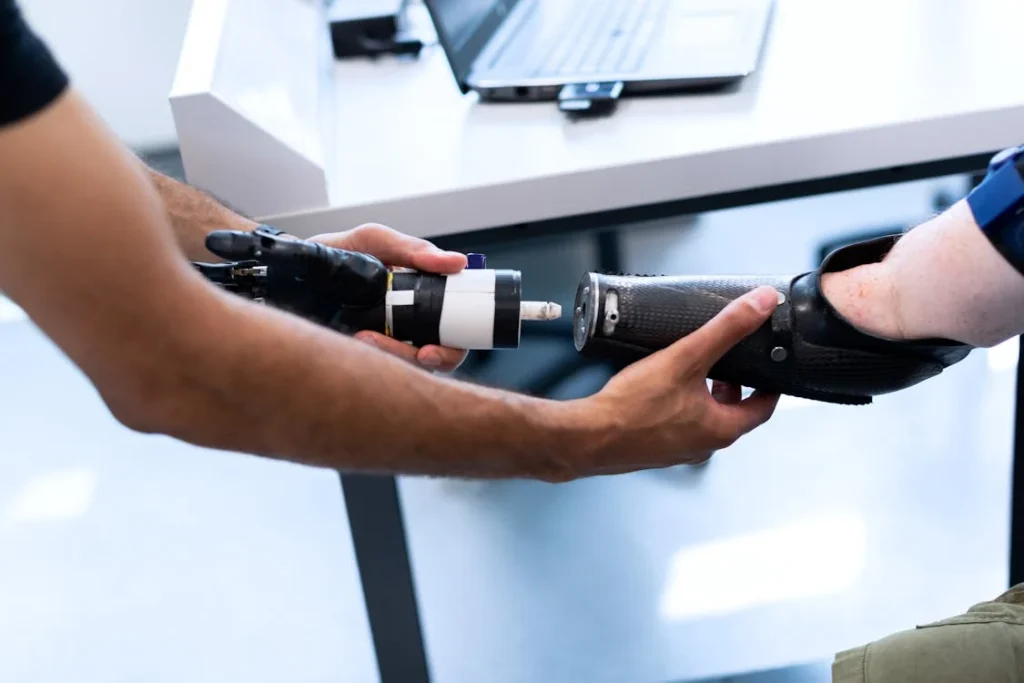Parenting is a journey filled with joy, challenges, and countless learning moments. When raising a child with a disability, these experiences take on a unique dimension. Every parent wants the best for their child, ensuring they grow up feeling loved, valued, and supported. However, the support systems available to families vary widely depending on cultural, social, and economic factors.
In some parts of the world, communities rally around families, offering guidance and encouragement. In others, parents may find themselves navigating the journey alone, facing societal stigma or a lack of resources. Understanding these differences can help parents seek the right kind of support while also advocating for better systems in their own communities.

Understanding Cultural Perspectives on Disability
Cultural beliefs shape how societies view disability, influencing the way children with disabilities are treated and the kind of support their families receive.
In some cultures, disability is seen as a natural part of life, leading to more acceptance and inclusion. In others, it may carry stigma, making it harder for families to find the help they need.
These perspectives impact everything from healthcare access to education and social integration.
Societies That Prioritize Inclusion
In many Western countries, disability is viewed through the lens of rights and inclusion. Nations like Canada, Sweden, and Australia have strong legal frameworks that protect the rights of children with disabilities.
These countries focus on early intervention, inclusive education, and community support. Parents are often encouraged to seek therapy, assistive devices, and educational accommodations to help their child thrive.
Schools are legally required to provide individualized education plans (IEPs), ensuring that children with disabilities receive tailored learning experiences.
Beyond education, public spaces and transport systems are designed to accommodate individuals with disabilities. Ramps, accessible restrooms, and reserved seating on public transport make it easier for children with mobility challenges to participate in everyday activities.
Cultural attitudes in these societies promote acceptance, with disability often viewed as a different way of experiencing the world rather than a limitation.
The Role of Family and Community in Traditional Societies
In contrast, many Asian, African, and Middle Eastern cultures place a strong emphasis on family and community support. Disability is often seen as a private matter, with families taking full responsibility for caregiving rather than relying on government services.
In countries like India and China, parents of children with disabilities often depend on extended family networks to provide emotional and financial support. Grandparents, aunts, and uncles play a vital role in caregiving, helping to ensure the child’s needs are met.
Religious and spiritual beliefs also shape perceptions of disability. In some cultures, disability is viewed as a test of faith, a karmic lesson, or even a blessing.
This perspective can offer comfort to families, helping them find meaning in their experiences. However, in some cases, these beliefs may prevent parents from seeking medical interventions or assistive technology, relying instead on traditional healing methods.
Access to formal support systems in these societies can be limited. Special education programs may not be widely available, and assistive devices like prosthetics or hearing aids can be expensive or difficult to obtain.
Parents often become the primary advocates for their children, pushing for better resources and fighting against social stigma.
The Impact of Stigma on Support Systems
In some cultures, disability is associated with shame, leading families to hide their child’s condition. This stigma can prevent parents from seeking professional help, leading to delayed diagnoses and limited access to essential therapies.
In regions where disability is misunderstood, children may face discrimination in schools and public spaces. Parents, too, may experience judgment from their communities, adding emotional stress to their caregiving responsibilities.
However, awareness campaigns and advocacy efforts are slowly changing these perceptions. Organizations around the world are working to educate communities, ensuring that disability is seen as a part of human diversity rather than a source of shame.
Social media has played a powerful role in connecting parents across cultures, allowing them to share experiences, seek advice, and build supportive networks.

The Role of Government and Non-Governmental Organizations
Government policies and non-governmental organizations (NGOs) play a crucial role in shaping the support systems available to parents of children with disabilities.
The level of assistance varies greatly from country to country, depending on factors such as economic development, political priorities, and public awareness.
Some nations have well-established programs offering financial aid, therapy, and inclusive education, while others leave much of the responsibility to families and private organizations.
Government Support: A Structured Approach
In countries with strong social welfare systems, governments take an active role in supporting children with disabilities and their families.
Nations such as the United States, Germany, and Japan provide structured programs that ensure access to healthcare, special education, and assistive technology.
In these places, early diagnosis and intervention programs are prioritized, helping children receive necessary therapies as soon as possible.
Financial assistance is another critical aspect of government support. Many developed countries offer disability allowances, tax benefits, and subsidies for assistive devices, reducing the financial burden on parents.
In some cases, families can receive home-based care support, allowing parents to balance work and caregiving responsibilities.
Government-funded special education schools and inclusive mainstream schools also ensure that children with disabilities receive a quality education tailored to their needs.
Legislation such as the Americans with Disabilities Act (ADA) in the U.S. and the Rights of Persons with Disabilities Act in India establish legal protections for people with disabilities.
These laws help ensure accessibility in public spaces, prevent discrimination, and promote equal opportunities. However, the effectiveness of these laws depends on enforcement, awareness, and cultural acceptance.
The Role of NGOs: Filling the Gaps
In many parts of the world, NGOs step in where government support is lacking. Organizations such as UNICEF, Handicap International, and local disability-focused charities provide critical services, from medical care to educational support.
NGOs also play an essential role in advocating for policy changes, raising awareness, and reducing stigma.
One of the most significant contributions of NGOs is in the area of assistive technology and prosthetics. Organizations like Robobionics are making advanced prosthetic solutions more accessible, ensuring that children with limb differences can lead independent lives.
By providing affordable, high-quality bionic hands like Grippy™, Robobionics helps families who might otherwise struggle to afford such technology.
Additionally, rehabilitation programs, including gamified home-based therapy, make the transition to using prosthetics smoother and more engaging for children.
NGOs also create support networks for parents. Many organizations run community groups, counseling sessions, and online forums where parents can connect, share experiences, and access professional advice.
These networks provide emotional support, helping parents feel less isolated and more empowered to advocate for their children.
Challenges in Implementing Support Systems
While government programs and NGOs provide essential support, challenges still exist. Bureaucratic red tape can make it difficult for parents to access services, with long wait times for medical evaluations, therapy sessions, or financial aid.
In some regions, a lack of trained professionals means that even when services are available, they may not meet the needs of children with disabilities.
Cultural factors also influence how these support systems are received. In societies where disability is stigmatized, parents may hesitate to seek help, fearing judgment or exclusion.
Raising awareness and changing societal attitudes remain ongoing challenges, requiring collaboration between governments, NGOs, and local communities.

Education and Inclusion: How Schools Support Children with Disabilities
Education is one of the most important factors in determining a child’s future, yet access to quality education for children with disabilities varies widely across the world.
The way schools accommodate children with special needs depends on cultural attitudes, government policies, and available resources. Some countries have well-developed inclusive education systems, while others still struggle with accessibility and acceptance.
Inclusive Education: A Step Toward Equality
In many developed nations, inclusive education is the standard approach. Schools are required by law to provide accommodations for children with disabilities, ensuring they learn alongside their peers in mainstream classrooms.
Countries like Finland, Canada, and the Netherlands follow a model where children with disabilities are integrated into regular schools with additional support from special educators, therapists, and assistive technology.
In these environments, children with disabilities benefit from social interactions with their peers, helping to reduce stigma and increase awareness.
Classroom modifications, such as adaptive seating, braille textbooks, and speech-to-text technology, make learning more accessible. Schools also employ individualized education plans (IEPs) that tailor lessons to each child’s specific needs, ensuring they can learn at their own pace.
The Reality in Many Developing Countries
In contrast, many developing nations still struggle with creating an inclusive education system. Schools may lack the infrastructure, trained staff, and funding necessary to accommodate children with disabilities.
In some cases, children with physical or intellectual disabilities are denied admission to mainstream schools, forcing parents to seek alternative education options or homeschool their children.
Special schools, while helpful, are not always available in every region, particularly in rural areas. Even when they exist, they may be underfunded, with outdated teaching materials and limited access to modern assistive technology.
As a result, many children with disabilities receive little to no formal education, limiting their opportunities later in life.
Cultural Attitudes and Their Influence on Education
Cultural beliefs play a significant role in determining how schools and communities treat children with disabilities. In some societies, there is a strong push to integrate these children into mainstream schools, ensuring they have the same opportunities as others.
In contrast, in cultures where disability is viewed negatively, parents may feel discouraged from sending their children to school, fearing discrimination or lack of support.
Advocacy and awareness programs are helping change these perceptions. Parents, educators, and disability rights organizations are working together to promote inclusive education and push for policy changes that support children with special needs.
The rise of online education and digital learning tools has also provided new opportunities for children who may struggle with traditional school environments.
The Role of Technology in Bridging the Gap
Assistive technology is playing an increasingly important role in making education more accessible for children with disabilities. Speech-to-text programs, interactive learning apps, and virtual classrooms are helping bridge the gap in education access.
For children with physical disabilities, prosthetic devices like Robobionics’ Grippy™ provide greater independence, allowing them to participate more actively in school activities.
Gamified rehabilitation programs are another innovative approach, helping children with disabilities develop motor skills, cognitive abilities, and confidence.
By integrating play-based learning with therapy, these programs make it easier for children to adapt to assistive devices while keeping the learning process engaging and enjoyable.
Despite the progress being made, there is still a long way to go in ensuring that all children, regardless of their abilities, receive the education they deserve.
Continued advocacy, investment in teacher training, and advancements in assistive technology will be essential in creating a more inclusive future for children with disabilities.

Emotional and Psychological Support for Parents and Children
Raising a child with a disability can be emotionally challenging for parents. From navigating medical treatments to advocating for inclusive education, the journey is often filled with stress, uncertainty, and moments of self-doubt.
At the same time, children with disabilities may struggle with feelings of isolation, frustration, or low self-esteem, especially if they experience stigma or exclusion in their communities.
Support systems play a crucial role in helping both parents and children manage these challenges. The availability and effectiveness of these systems depend on cultural attitudes, family dynamics, and access to mental health resources.
The Emotional Journey of Parents
When parents first learn that their child has a disability, they often go through a range of emotions. Some may feel grief over the life they had imagined for their child, while others may experience guilt, wondering if they could have done something differently.
In cultures where disability is not openly discussed, parents may also feel isolated, struggling to find guidance or emotional support.
The way society responds to disability can either ease or add to these emotional struggles. In supportive cultures, where disability is seen as a natural part of human diversity, parents are more likely to feel empowered and encouraged.
In societies where stigma exists, parents may face criticism, unsolicited advice, or even blame from relatives and community members.
To cope with these emotions, parents need access to counseling, peer support groups, and mental health professionals who understand the unique challenges of raising a child with special needs.
In many Western nations, therapy and support groups for parents are widely available, helping them process their emotions, connect with others, and develop strategies to manage stress.
However, in cultures where mental health is stigmatized, seeking professional help can be difficult. Parents may rely on informal support from family members, religious leaders, or community elders instead.
While these sources of support can be valuable, they may not always provide the practical tools needed to navigate the emotional aspects of raising a child with a disability.
The Psychological Well-Being of Children
Children with disabilities often face emotional and psychological challenges, especially if they encounter bullying, exclusion, or feelings of being “different” from their peers.
The way their family, school, and society treat them has a significant impact on their self-esteem and overall well-being.
In societies that embrace inclusion, children with disabilities are more likely to develop a positive self-image. They see representation in the media, have access to adaptive sports and recreational activities, and are encouraged to pursue their dreams like any other child.
These positive experiences help build resilience, confidence, and a strong sense of self-worth.
On the other hand, in cultures where disability is viewed negatively, children may struggle with self-acceptance. They might face teasing or discrimination at school, feel excluded from social activities, or internalize negative beliefs about their abilities.
This can lead to anxiety, depression, or reluctance to participate in daily life.
Parents play a crucial role in shaping their child’s self-esteem. Encouraging independence, celebrating achievements (no matter how small), and fostering an environment of love and acceptance can make a world of difference.
Therapy and counseling services, when available, can also help children develop coping strategies and build emotional resilience.
The Power of Community Support
One of the most effective ways to provide emotional and psychological support to both parents and children is through strong community networks.
Parent support groups, disability advocacy organizations, and online communities offer a space where families can share experiences, learn from one another, and feel less alone in their journey.
In many countries, NGOs and advocacy groups organize social events, workshops, and mentorship programs for families of children with disabilities.
These initiatives not only provide emotional support but also equip parents with practical knowledge about assistive technology, therapy options, and education rights.
Social media has also played a transformative role in connecting families across the world.
Parents who may feel isolated in their local communities can now access global support networks, gain insights from experts, and find encouragement from others who have walked a similar path.
At Robobionics, we believe that no parent should have to navigate this journey alone. Our commitment goes beyond providing advanced prosthetic solutions like Grippy™—we also advocate for greater awareness, accessibility, and emotional support for families of children with disabilities.
Whether through technological advancements or community initiatives, our goal is to empower families and help children embrace their abilities with confidence.

The Importance of Rehabilitation and Adaptive Training
For children with disabilities, rehabilitation and adaptive training are key to building independence and confidence. Whether a child has a physical disability, sensory impairment, or developmental challenge, the right training can help them navigate daily life with greater ease.
However, the availability and quality of rehabilitation services vary widely depending on cultural, economic, and social factors.
Early Intervention and Its Impact
Early intervention plays a critical role in shaping a child’s ability to adapt and thrive. When children receive therapy at a young age, they have a better chance of developing essential skills that will help them as they grow.
Physical therapy, occupational therapy, and speech therapy are some of the most common types of rehabilitation services that support children with disabilities.
In many developed countries, early intervention is widely promoted, and parents are encouraged to seek professional guidance as soon as they notice developmental delays.
Programs in countries like the United States, Canada, and Germany offer structured rehabilitation plans, often covered by insurance or government funding. Parents are provided with resources to work alongside therapists, ensuring their child gets consistent support at home.
However, in regions where access to professional therapy is limited, parents may have to rely on alternative methods. In some cultures, traditional healing practices or community-based rehabilitation programs take the place of formal therapy.
While these approaches can be beneficial, they may not always be backed by scientific research, leading to inconsistent results. Raising awareness about the importance of evidence-based rehabilitation is crucial in ensuring that children receive the most effective care.
The Role of Assistive Technology in Rehabilitation
Advancements in assistive technology have transformed the rehabilitation process for children with disabilities. Devices such as prosthetics, mobility aids, and communication tools help children gain independence and improve their quality of life.
Robobionics, for example, has developed Grippy™, a lightweight and ergonomic bionic hand designed to help children regain functional movement.
Gamified rehabilitation is another innovation that is making therapy more engaging and effective. Traditional rehabilitation exercises can be repetitive and frustrating for children, but when combined with interactive games, they become more enjoyable.
By turning therapy into a fun and rewarding experience, gamified programs help children stay motivated and committed to their rehabilitation journey.
Home-based rehabilitation is also gaining popularity, allowing parents to take an active role in their child’s progress. With the help of online resources, mobile apps, and virtual therapy sessions, children can practice their exercises in a familiar and comfortable environment.
This is particularly beneficial for families who live in remote areas where access to in-person therapy is limited.
Cultural Attitudes Toward Rehabilitation
The way societies view rehabilitation can greatly influence whether children with disabilities receive the support they need. In cultures where independence is encouraged, rehabilitation is often seen as a necessary step toward helping children lead fulfilling lives.
Parents are proactive in seeking therapy, assistive devices, and adaptive training programs that can help their child become more self-sufficient.
However, in societies where disability is seen as a lifelong dependency, rehabilitation may not be prioritized. Some parents may feel that their child will always need full-time care and may not invest in training programs that promote independence.
Additionally, in cultures where disability carries stigma, families may hesitate to enroll their child in rehabilitation programs out of fear of drawing attention to their condition.
Breaking these barriers requires education and advocacy. Parents need to understand the long-term benefits of rehabilitation and how it can empower their child.
Governments and NGOs must work together to make these services more accessible, especially in underserved communities.
At Robobionics, we believe that every child deserves the opportunity to reach their full potential. Through innovative prosthetic solutions, gamified rehabilitation, and awareness initiatives, we are committed to helping children with disabilities lead independent and fulfilling lives.

Building a More Inclusive Future: The Role of Society in Supporting Families
While parents play the most direct role in caring for a child with a disability, the broader society also has a responsibility to create an inclusive and supportive environment.
The way communities, workplaces, schools, and governments respond to disability can either empower or discourage families. A society that values inclusion makes it easier for children with disabilities to thrive, while a lack of awareness or accessibility can create unnecessary barriers.
Changing Social Perceptions of Disability
One of the most significant challenges parents face is societal perception. In many cultures, disability is still misunderstood, and children with disabilities may be seen as burdens rather than individuals with unique abilities.
This mindset can limit opportunities, increase stigma, and make parents feel isolated in their struggles.
Education is key to changing these perceptions. When schools, media, and public campaigns actively promote disability awareness, it helps shift attitudes.
Seeing individuals with disabilities represented in movies, books, and advertisements normalizes their experiences and challenges outdated stereotypes.
Many countries are now incorporating disability awareness into school curriculums, teaching children from a young age that differences should be embraced, not feared.
Parents can also play an active role in breaking down stigma by advocating for their child in their communities. Engaging with neighbors, schools, and religious or social groups can help raise awareness and create a more supportive environment.
When people see children with disabilities actively participating in society—whether through sports, education, or community events—they begin to recognize their potential.
The Role of Accessible Infrastructure
Physical accessibility is another crucial aspect of inclusion. A child with a disability cannot fully participate in society if public spaces, schools, transportation, and recreational facilities are not designed with accessibility in mind.
In countries with strong disability rights laws, cities have wheelchair ramps, accessible public transport, and inclusive playgrounds. However, in many regions, infrastructure remains a significant barrier.
For example, in some developing nations, many schools lack wheelchair ramps, making it nearly impossible for children with mobility impairments to attend.
Public transport may not accommodate individuals with disabilities, limiting their ability to travel independently. Even something as simple as finding an accessible restroom can be a daily challenge.
Governments, urban planners, and businesses need to prioritize accessibility in their designs. Simple modifications like ramps, elevators, braille signage, and voice-assisted technology can make a huge difference.
By making public spaces more inclusive, society ensures that children with disabilities and their families can participate fully in daily life.
Employment and Economic Opportunities for Parents
Raising a child with a disability often comes with financial strain. Medical treatments, therapy, assistive devices, and specialized education can be expensive, and in many cases, one parent may need to reduce their working hours or quit their job entirely to become a full-time caregiver.
This can put families under economic stress, especially in cultures where financial support from the government is minimal.
To address this, workplaces must adopt more flexible policies that support parents of children with disabilities. Remote work options, flexible schedules, and paid family leave can help parents balance their caregiving responsibilities while maintaining financial stability.
Some companies are now offering employee assistance programs specifically for parents of children with special needs, providing counseling, financial planning, and legal advice.
Additionally, societies should create more job opportunities for individuals with disabilities themselves. Vocational training programs, inclusive hiring policies, and workplace accommodations can help young adults with disabilities gain independence and contribute to the workforce.
When children see role models with disabilities succeeding in various professions, it gives them confidence in their own future potential.
How Communities Can Offer Support
While government policies and infrastructure changes are important, true inclusion happens at the community level. Families raising children with disabilities often benefit the most from strong local support networks.
These networks can take many forms, from religious groups and parenting support circles to disability advocacy organizations.
Community-based programs such as adaptive sports leagues, creative arts workshops, and peer mentorship initiatives can give children with disabilities a sense of belonging.
In many countries, inclusive sports like wheelchair basketball, adaptive swimming, and sensory-friendly playgroups provide opportunities for socialization and skill development. Such initiatives help children build confidence and form friendships, reducing feelings of isolation.
Parents can also advocate for more inclusive events in their communities. Schools can be encouraged to host disability awareness days, local businesses can be urged to make their spaces more accessible, and policymakers can be pushed to improve local services.
When everyone in a community works together to remove barriers, families of children with disabilities feel more supported and empowered.
At Robobionics, we believe that true inclusion goes beyond technology—it requires societal change. While we are proud to offer innovative prosthetic solutions like Grippy™, we are equally committed to advocating for accessibility, awareness, and equal opportunities.
By working together, we can build a world where every child, regardless of ability, has the chance to reach their full potential.
Conclusion
Parenting a child with a disability comes with unique challenges, but with the right support systems, every child can thrive. Cultural attitudes, government policies, and community involvement all play a crucial role in shaping the experiences of families. In societies that prioritize inclusion, parents have access to medical care, education, and emotional support, making their journey easier. However, in regions where stigma and lack of resources persist, families often struggle alone.
Change starts with awareness. By advocating for better policies, improving accessibility, and fostering inclusive mindsets, we can create a world where children with disabilities are valued and supported. Parents should never have to navigate this journey in isolation—stronger communities, better infrastructure, and technological advancements like Robobionics’ Grippy™ can help bridge the gaps.
The future of disability inclusion depends on collective effort. Governments, businesses, and individuals must work together to remove barriers and create equal opportunities. Every child deserves the chance to reach their full potential, and with compassion and action, we can ensure no family is left behind.



